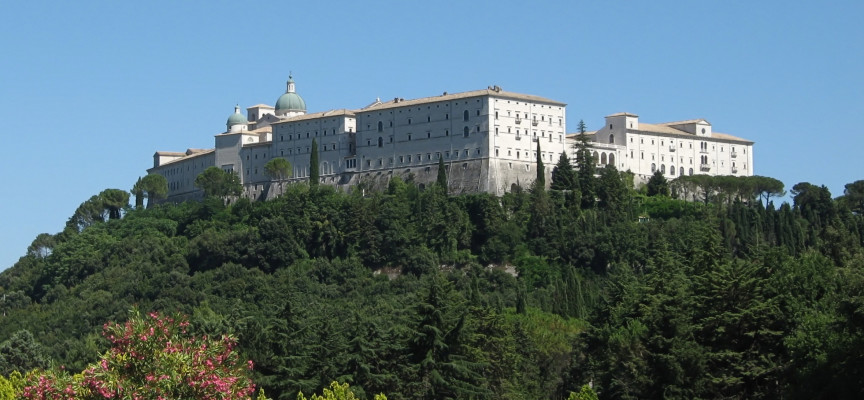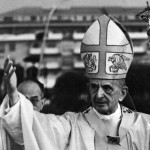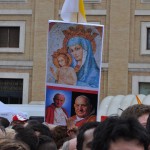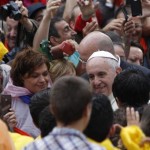“Messenger of peace, molder of union, magister of civilization, and above all herald of the religion of Christ and founder of monastic life in the West”: with these honours, on 24th October fifty years ago, the Blessed Paul VI proclaimed Abbot St Benedict the main patron saint of all of Europe. On the same day, Pope Montini re-consecrated to God the temple of Montecassino, destroyed twenty years earlier in the world war.
It was just from Montecassino – in the VI and VII centuries – that Benedict’s disciples spread the evangelical message in Western Europe: Augustine came from today’s England and was the first bishop of Canterbury. Columbanus left his native Ireland to evangelise part of France, Switzerland and, in Bobbio, Italy, he founded an important monastery. Patrick in Ireland and in the British Isles, Boniface in Rhineland and Bavaria, Willibrord in today’s Luxembourg spread God’s word and sowed the seeds of solidarity. Later on, in the IX and X centuries, the brothers Cyril and Methodius evangelised the Slavic East.
Why was Benedict proclaimed the patron saint of Europe? Which “Benedictine” values may still apply to the old Continent?
Those who are as grey-haired as myself have learnt since their first years at school that Benedict’s disciples saved the Greek-Roman culture by copying on parchments the works of the great classic writers, who risked going lost in the dark centuries that followed the fall of the Roman Empire.
The monks lived – and live – in a community, where time was – is – punctuated by prayer, by reflecting on the Word, by silence (ora) and work (labora). Copying the classic authors was part of their work, but more than amanuenses they were creators of communities, in which nobody lived at the expense of anybody else. No one was left out of those communities: guests were welcomed as if they were “Christ Himself”. Monasteries practiced – practice – the office of Charity. The monks’ time was – is – spent in prayer, work and charity.
Nowadays, in our continent, time is spent in frenzy rather than in reflection, in self-admiration rather than in taking care of other people. The stages of life too seem to destroy time: for young people, instead of being a culturally formative time in preparation to a professional career, their age is often experienced as ambitious careerism. For many elderly people, time does not mean wisdom, it means the worry to be always fit and sprightly. The past is a chance for regret, for wistfulness, for nostalgia. The future is frenzy. The “dynamic of the provisional” (fr. Roger) is not lived in the present. The Benedictines teach to today’s Europeans the value of time, that people need to take back without letting themselves be attracted by an elusive “after” or by a potentially depressing “before”.
By taking back their time, the Europeans will discover the value of silence, which is about reflection, the loved ones, contemplation. In the solitude of one’s conscience, even today’s Gentiles (the agnostics, atheists, rationalists) will wonder about the Transcendent and the Unknown. Only the non-thinkers, crushed under a rowdy and aggressive noise, will be unable to fill their inner void. Peace of mind will imbue family relations with sweetness. Schooling will find reasons for spiritual growth in reflection and in reasoned criticism. Politics, new and broader horizons.
Silence will make listening easier. In monasteries, at the refectory, as well as feeding one’s body with food, one feeds one’s soul by listening to readings. Today’s world consumes words in a way that risks tearing their real meaning off them. Such consumption is also aided by the supermarket, which is offered by the new technology, by the media. Stopping and listening to other people as a completely free gesture, talking to anyone, staring at nature and be amazed by beauty are prerequisites to distinguish what is viable from what is insubstantial. Culture too needs to be taken back, in its diversity, resisting the standardisation of mainstream thinking.
In Benedict’s rule, work is intended not as a mere artefact, but as a means to give value to human dignity and to reawaken man’s creativity. In it, the monks found – find – their own inner life and discovered – discover – the unique abilities that no one else can offer. Conversely, today’s European society is obsessed with production and the ensuing profit. Even leisure time is regarded as a continuation of work, which becomes dehumanising for people and detrimental for the Creation, and is only deemed to be a source of income, not a need to express one’s talents and wishes. Eventually this prevents thousands of people accessing to basic needs, especially if they are looking for inclusion or trying to fit in.
Fifty years ago, from Montecassino, Paul VI called “all men of good will” to recompose the “absolute beauty… broken through a maze of historical events” through the book to bring back a taste for knowledge, through the plough to inspire in men “loving care of order and justice that forms the foundation of true society”, and through the Cross, through Faith, to give “consistency and growth to the ordering of public and private life”.
Europe is longing for life, yet it is tired, empty. It is half-expectant, half-disconsolately resigned.
To recover from such depression, our continent needs to find, again, the meaning of being together, the value of time, of silence, of listening, of working and of accepting, as Benedict used to teach.
“Messaggero di pace, realizzatore di unione, maestro di civiltà e soprattutto araldo della religione di Cristo, fondatore della vita monastica in occidente”: con questi titoli il beato Paolo VI proclamava il 24 ottobre di cinquant’anni fa l’abate San Benedetto patrono principale dell’intera Europa. Nello stesso giorno, papa Montini riconsacrava a Dio il tempio di Monteccasino distrutto vent’anni prima durante il conflitto mondiale.
Proprio partendo da Montecassino – nei secoli VI e VII – i seguaci di Benedetto diffusero nell’Occidente dell’Europa il messaggio evangelico: Agostino arrivò all’odierna Inghilterra e fu il primo vescovo di Canterbury. Dall’Irlanda partì Colombano per evangelizzare parte della Francia, della Svizzera e, in Italia, a Bobbio fondò un importante monastero. Patrizio in Irlanda e nelle isole britanniche, Bonifacio in Renania e in Baviera, Villibrordo nell’attuale Lussemburgo diffusero la parola di Dio e seminarono i germi della solidarietà. Più tardi, nei secoli IX e X, i fratelli Cirillo e Metodio evangelizzarono l’Oriente slavo.
Perché Benedetto fu proclamato patrono d’Europa? Quali valori “benedettini” si possono applicare oggi al vecchio Continente?
Coloro che hanno i capelli grigi come chi scrive, fin dai primi anni di scuola appresero che i seguaci di Benedetto salvarono la cultura greco-romana trascrivendo su pergamene le opere dei grandi scrittori classici, che rischiavano di andare perdute nei secoli bui che seguirono alla caduta dell’Impero romano.
I monaci vivevano – e vivono – in una comunità dove il tempo era – è – scandito dalla preghiera, dalla riflessione sulla Parola, dal silenzio (ora) e dal lavoro (labora). La trascrizione degli autori classici faceva parte del loro lavoro, ma essi, prima di essere amanuensi, furono creatori di comunità, nelle quali nessuno viveva a spese degli altri. Da esse nessuno veniva escluso: l’ospite veniva accolto come “Cristo in persona”. Nei monasteri si praticava – si pratica – il ministero della Carità. Tra preghiera, lavoro e carità scorreva – scorre – il tempo dei monaci.
Oggi, nel nostro continente, il tempo è occupato dal frenetismo più che dalla riflessione, dall’ammirazione di se stessi più che dall’attenzione verso gli altri. Anche le tappe della vita sembrano distruggere il tempo: per i giovani la loro età, anziché essere tempo di formazione culturale in vista del lavoro, è spesso vissuta come carrierismo rampante. Per molti anziani il tempo assume non il carattere della saggezza, ma assillo per essere agili e scattanti. Il passato è occasione di rimpianto, di malinconia, di nostalgia, il futuro è frenesia. Non si vive nel presente la “dinamica del provvisorio” (fr. Roger). I benedettini insegnano agli europei d’oggi il valore del tempo che occorre recuperare senza lasciarsi attirare dal “dopo” che sfugge e dal “prima” che può deprimere.
Appropriandosi del tempo gli europei scopriranno il valore silenzio, che è riflessione, affetti cari, contemplazione. Nella solitudine della propria coscienza anche i gentili d’oggi (gli agnostici, gli atei, i razionalisti) s’interrogheranno sul Trascendente e sullo Sconosciuto. Solo i non pensanti, sommersi dal chiasso sguaiato e aggressivo, non potranno riempire il loro vuoto interiore. Sarà la serenità a improntare a dolcezza le relazioni familiari. La scuola ritroverà nella riflessione e nella critica ragionata motivi di crescita spirituale. La politica nuovi e più larghi orizzonti.
Il silenzio favorirà l’ascolto. Nei monasteri, durante la mensa, oltre a nutrire il corpo col cibo, si nutre lo spirito con l’ascolto di letture. Nel mondo d’oggi c’è un consumo di parole che rischia di strappare a esse il vero significato. Questo consumo viene favorito anche dal supermercato offerto dalle nuove tecnologie e dai media. Mettersi in ascolto degli altri nel segno della gratuità, dialogare con tutti, sostare davanti alla natura e stupirsi della bellezza sono condizioni per distinguere ciò che è vitale da ciò che è inconsistente. Sarà necessario recuperare anche la cultura nelle sue diversità, resistendo all’omologazione del pensiero dominante.
Nella regola di Benedetto il lavoro è concepito non solo come manufatto, ma mezzo per valorizzare la dignità dell’uomo e per risvegliarne la creatività. In esso i monaci ritrovavano – ritrovano – la propria interiorità e scoprivano – scoprono – le singolari capacità che nessun altro può offrire. La società europea contemporanea, al contrario, è ossessionata dalla produzione e dal conseguente profitto. Perfino il tempo libero è considerato come continuazione del lavoro, che diventa disumanizzante per la persona e deleterio per il creato e viene considerato solo come fonte di guadagno, non come bisogno per esplicitare abilità e desideri. Ciò finisce per impedire l’accesso ai bisogni essenziali a migliaia di persone, soprattutto a chi è alla ricerca di un inserimento o di un’integrazione.
Cinquant’anni fa, Paolo VI da Montecassino invitava “tutti gli uomini di buona volontà” a ricomporre la “bellezza assoluta… spezzata in un groviglio di eventi storici” attraverso il libro per restaurare il gusto del sapere, l’aratro capace di ispirare agli uomini “la cura amorosa dell’ordine e della giustizia, come base della vera socialità” e con la Croce, con la Fede, capace di dare “consistenza e sviluppo agli ordinamenti della vita pubblica e privata”.
L’Europa è ansiosa di vita, eppure è stanca e vuota. È tra uno stato di attesa e una sconsolata rassegnazione.
Per guarire da questa depressione occorrerà che il nostro continente ritrovi il senso dello stare assieme, il valore del tempo, del silenzio, dell’ascolto, del lavoro e dell’accoglienza come ha insegnato Benedetto.
Edoardo Zin
Latest posts by Edoardo Zin (see all)
- 60° Treaties of Rome: a Europe that struggles and hopes - 19 marzo 2017
- Europe lacks the great politics - 28 dicembre 2016
- The strength of Robert Schuman - 30 aprile 2016











